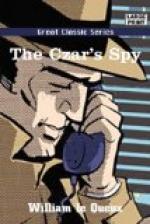Carducci had left me to the correspondence for half an hour or so, and I confess I was in no mood to write replies in that stifling heat, therefore I sat at the Consul’s big table, smoking a cigarette and stretched lazily in my friend’s chair, resolving to escape to the cool of England as soon as he returned in the following week. Italy is all very well for nine months in the year, but Leghorn is no place for the Englishman in mid-July. My thoughts were wandering toward the English lakes, and a bit of grouse-shooting with my uncle up in Scotland, when the faithful Francesco re-entered, saying—
“I’ve sent the captain and his madman away till this afternoon, signore. But there is an English signore waiting to see you.”
“Who is he?”
“I don’t know him. He will give no name, but wants to see the Signor Console.”
“All right, show him in,” I said lazily, and a few moments later a tall, smartly-dressed, middle-aged Englishman, in a navy serge yachting suit, entered, and bowing, enquired whether I was the British Consul.
When he had seated himself I explained my position, whereupon he said—
“I couldn’t make much out of your clerk. He speaks so brokenly, and I don’t know a word of Italian. But perhaps I ought to first introduce myself. My name is Philip Hornby,” and he handed me a card bearing the name with the addresses “Woodcroft Park, Somerset ------ Brook’s.” Then he added: “I am cruising on board my yacht, the Lola, and last night we unfortunately went aground on the Meloria. I have a new captain whom I engaged a few months ago, and he seems an arrant fool. Very fortunately for us a fishing-boat saw our plight and gave the alarm at port. The Admiral sent out two torpedo-boats and a tug, and after about three hours they managed to get us off.”
“And you are now in harbor?”
“Yes. But the reason I’ve called is to ask you to do me a favor and write me a letter of thanks in Italian to the Admiral, and one to the Captain of the Port—polite letters that I can copy and send to them. You know the kind of thing.”
“Certainly,” I replied, the more interested in him on account of the curious suspicion that the port authorities seemed to entertain. He was evidently a gentleman, and after I had been with him ten minutes I scouted the idea that he had endeavored to cast away the Lola.
I took down a couple of sheets of paper and scribbled the drafts of two letters couched in the most elegant phraseology, as is customary when addressing Italian officialdom.
“Fortunately, I left my wife in England, or she would have been terribly frightened,” he remarked presently. “There was a nasty wind blowing all night, and the fool of a captain seemed to add to our peril by every order he gave.”
“You are alone, then?”
“I have a friend with me,” was the answer.
“And how many of the crew are there?”




